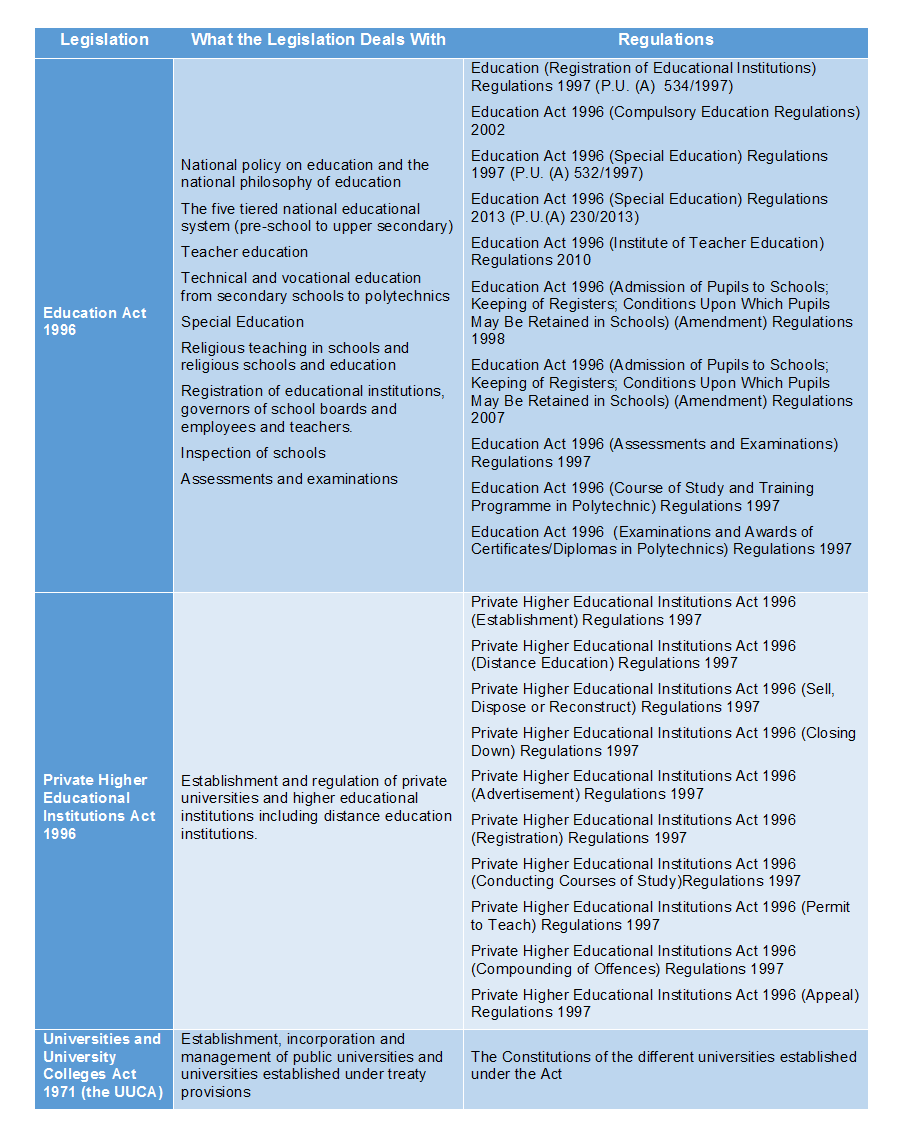Introduction (updated May 2024)
This is a description of the Malaysian educational system as seen through the policies, laws, and regulations that have contributed to the development of the system. It is presented as a detailed introduction to the entire education system, public and private, providing access to primary legislation, regulations, and when available, circulars issued by the Ministry of Education (MOE).
Between 2010 and 2015, two important documents were published, The Education Blueprint 2013-2025 (Pre-School to Post Secondary Education and the Education Blueprint (2015-2025) (Higher Education). The two Blueprints are intended to chart the development of education in Malaysia up to 2025. Various actions that have been taken in furtherance of the two documents have been publicized by the relevant authorities through annual reports and information published on the Internet.
With the change of government after the May 2018 General Elections, discussions on national education have once again taken center stage. Announcements by the Minister of Education and officials of his Ministry suggest a possible overhaul of all educational policies at all levels of education. The new Minister of Education (with combined portfolios on general and higher education) attempted many proposals at the school level, raising controversies in the process but there were no significant changes made either to policies or the practice in schools. The National Education Advisory Council was revived with new members representing many sectors, but neither their discussions nor reports, if any, have been published.
Dr. Maszlee was more successful in initiating reform of the higher education sector. At least six committees were appointed to review the different sectors of higher education. A special committee was created to review the Universities and University Colleges Act 1970 to replace the Act with new legislation on higher education that would harmonize the different laws. The Private Higher Education Governance Department in the Ministry began consultations with representatives of the private sector under a series of 'Way Forward' meetings. The Committee on Higher Education produced a series of papers that recommended changes to policies and laws. The Way Forward committee produced a collection of papers in a book bearing the title Education as Industry.
Dr Maszlee, unfortunately, resigned from office on the first working day of January 2020. Political manoeuvrings in the first two months of that year saw the demise of the Pakatan Harapan government and with that the demise of the reforms Dr. Maszlee initiated. To their credit, the initiators of reform in the private sector navigated the idea of Education as an Industry through the new government. At the time of this update, meetings are continuing between the ministry officials and the private sector to implement the changes recommended.
Prime Minister Anwar Ibrahim's Unity Government
Following the November 2022 general election which did not yield a clear majority to any groups or coalition that contested the elections, the Yang Di Pertuan Agong invited Anwar Ibrahim to assemble a coalition or unity government. Anwar Ibrahim's Pakatan Harapan (PH) had to rely on an alliance with the United Malays National Organization (UMNO) and other parties and coalitions to secure a parliamentary majority.
Fadhlina Sidek, a lawyer and social activist was appointed Minister of Education on 3 December 2022. At the same time, Datuk Seri Khaled Nordin was appointed Minister of Higher Education. This was the latter's second stint in that ministry. He was Minister of Higher Education from 2008 to 2013 under the Barisan Nasional administration. However, after a cabinet reshuffle in December 2023, Datuk Seri Dr. Zambry Abdul Kadir took over the ministry.
Resolutions and Guidelines
Khaled Nordin and Zambry Abdul Kadir issued separate statements when appointed ministers on how they proposed to develop the Higher Education Ministry and the higher education sector. Each statement, the first as eleven resolutions and the second as a manifesto emphasized different aspects of higher education. Neither statement mentioned the long-standing demands from students and academics for the repeal of the Universities and University Colleges Act of 1971 (AUKU). Nor was there any statement about systemic issues or the policy-making role of the National Council on Higher Education.
Amendments to Universities and University Colleges Act 1971
Despite ministerial claims that recent (March 2024) changes to the Universities and University Colleges Act 1971 were intended to empower students in public universities, these changes make no significant changes to the rights of students in those universities. The focus of the change is on the student disciplinary provisions of the original Act dealing with the collection of money by students or student bodies.
Legislation on Education
The table below shows the main legislation dealing with education, including the regulations made under the respective Acts. However, these are not the only legislation dealing with education in the country. Other legislation dealing with vocational training and specialized educational institutions will be discussed separately.
Table 1




